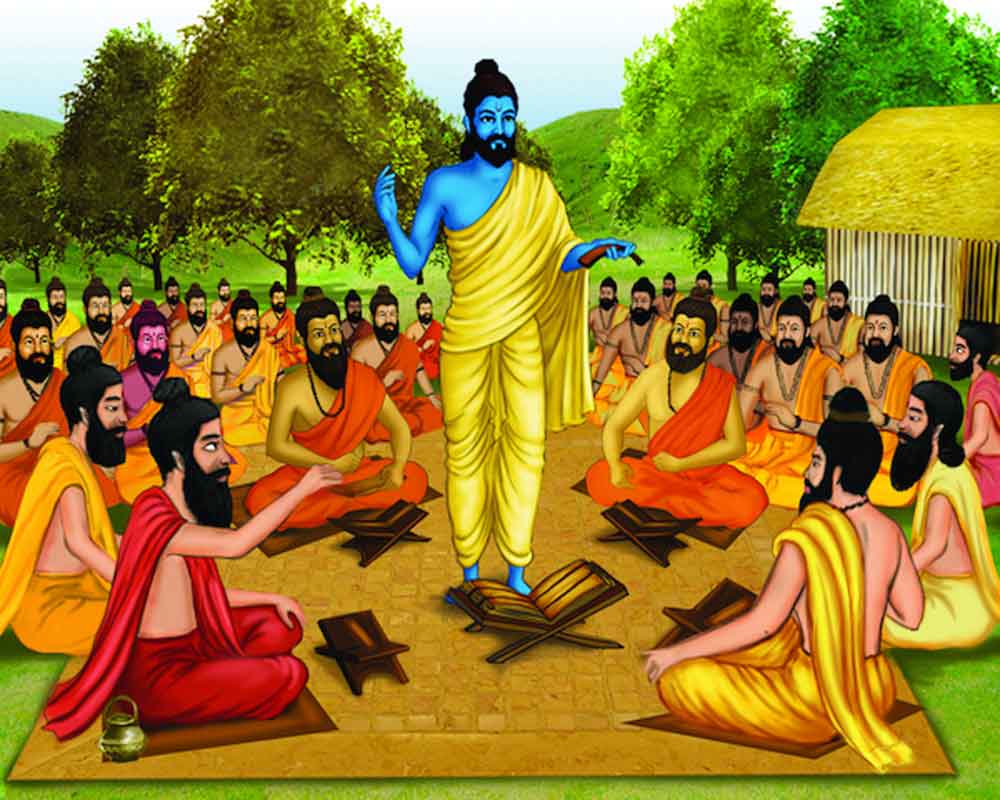Dharma and Satya have profound implications on our actions and beliefs
These two words sometimes confuse about what they convey. What is the relationship between these two? Don’t they sound similar? They do. Then, there is ‘kartavya’ (duty). This word also is interlinked with these two. I will try to unravel their mystery in this article. Beginning with their definitions, dharma is what applies to everyone. For example, the nature of fire is to burn and cause it to burn. Similarly, dharma sustains life, virtue and moral duties on the planet Earth. The word Satya simply means facts like the Sun rising in the East. Some examples will shed more light on these two words. Starting with dharma, what is our svadharma or duty (kartavya)?
Lord Krishna has explained that when we are born we have certain qualities due to which we are suitable naturally to do certain activities. (4.13) This is our svadharma, i.e. our dharma. Some children are naturally inclined to play sports, and if allowed to do so excel. This is his dharma by which he entertains others and also earns his livelihood. Arjuna, who was a Kshatriya had a specific dharma due to his birth, which he was supposed to uphold. He spoke about protecting family dharma (values). If not practised, it could have caused many horrible consequences. (1.38-1.45) Svadharma defines an individual’s duties.
Dhratarashtra was born blind. Therefore, he was unfit to rule even though he was the elder brother. His younger brother Pandu was enthroned by the king. Upon his untimely death, Dhratarashtra was made a stopgap king till the eldest son of Pandu gained adulthood. This was a factual position, ie. Satya. Dhratarashtra’s lineage was not entitled to be made king. But he refused to accept this fact, which was against dharma even though his eldest son Duryodhana was unfit to be made king. This resulted in the Mahabharata War, and his family was justly punished for trying to undo dharma. Dharma is worth practising for our good. It is meant for everyone to honour; one should follow it as far as feasible. Dharma is supreme; it is above everything. Satya has also many dimensions. It is a fact that all are similar souls. Satya should be used for correct behaviour, i.e. our activities should be based on it. For example, God should be worshipped by one and all. Satya is frequently situational. For example, children should study in school, but once at home should play. It changes or appears to change in our eyes or vis-à-vis our resources. For example, how much to eat? If not so hungry eat less and if quite hungry more. Similarly, if there is scarcity, the use of resources should be restricted. We have to always see what suits us and is appropriate. Our behaviour should match with the prototype in this matter. Truth is also what we perceive. Because we are too small to know the truth in its entirety, reality or essence. Truth can be known from scriptures like the Bhagavad-Geeta. Still, truth is limited; knowledge takes us to the level of humility, to be modest – a high quality.
Now let us turn to the relationship between dharma and Satya. Truth is an instrument; dharma is the system. Truth should always support dharma because truth is the basis of dharma. Earlier, i.e. in Sattvayuga and Treta yuga, truth and dharma were synonymous. Lord Krishna changed it in Dwaparyuga and made dharma superior to truth because truth is not habitually spoken in this yuga. That is the reason Yudishthir was asked to speak the confusing truth – “Ashavathama hatha it; narova kunjarova”. Because dharma was at stake. The same rule applies today. We must always go by dharma; truth can be sacrificed for it. Let’s, therefore, make dharma the basis of all our acts.
What is the conclusion? Both dharma and truth are important, but dharma is more important. Truth can be sacrificed for the sake of dharma, but only temporarily, not permanently.
(The writer is a spiritual teacher, views are personal)
























